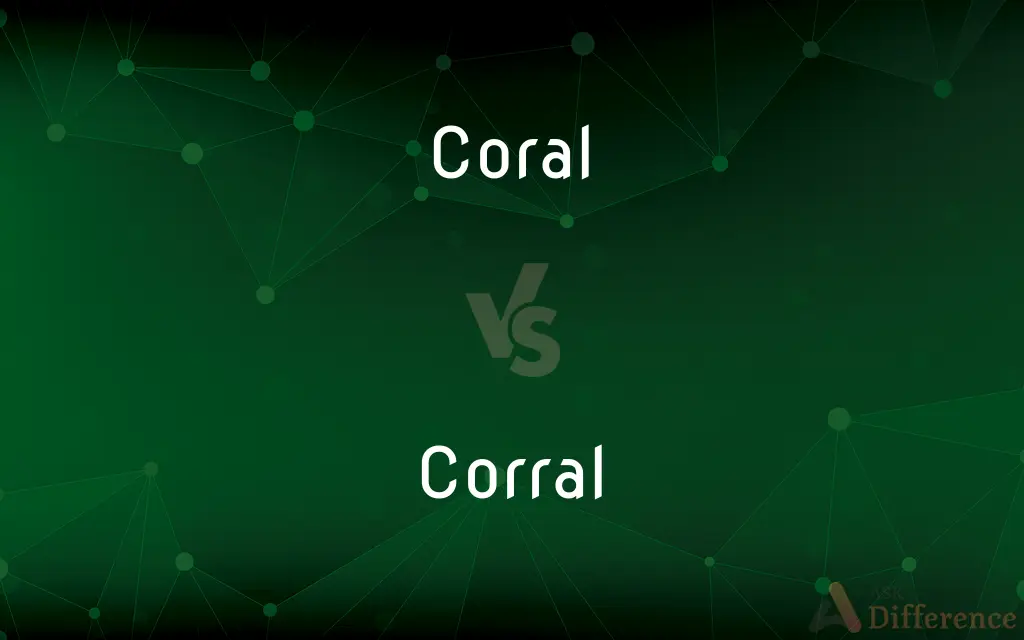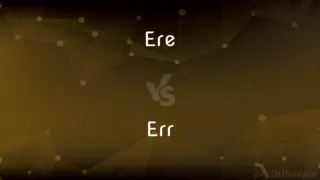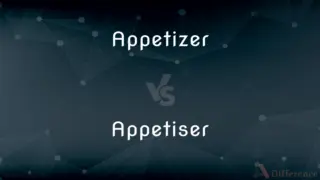Coral vs. Corral — What's the Difference?
By Tayyaba Rehman & Maham Liaqat — Updated on March 28, 2024
Coral refers to marine invertebrates, while corral is an enclosure for animals.

Difference Between Coral and Corral
Table of Contents
ADVERTISEMENT
Key Differences
Coral, primarily found in warm, shallow marine waters, forms colorful reefs that are crucial for marine biodiversity. On the other hand, a corral is a structure designed to enclose animals, typically livestock, to keep them confined for management purposes.
While corals are living organisms contributing to ecological balance and marine life support, corrals serve a functional, human-made purpose in agriculture and animal husbandry. The significance of coral lies in its environmental role, whereas the value of a corral is in its utility for managing and protecting livestock.
The preservation of coral reefs is a global environmental concern due to their vulnerability to climate change, pollution, and destructive fishing practices. Efforts to protect and restore coral ecosystems underscore the importance of these organisms to marine life and human economies. Conversely, the design and use of corrals reflect human needs for efficient livestock management, which can include considerations for the animals' welfare and the sustainability of farming practices.
Coral and corral, though phonetically similar, represent vastly different entities—one being a vital component of marine ecosystems, and the other, a practical tool in animal husbandry. Their importance is context-dependent, with coral playing a critical role in the natural world and corrals serving essential functions in agricultural settings.
Comparison Chart
Nature
Living marine organisms
Enclosure for animals
ADVERTISEMENT
Environment
Marine ecosystems
Agricultural or ranching settings
Purpose
Support biodiversity, form reefs
Confine and manage livestock
Material/Composition
Calcium carbonate skeletons
Wood, metal, or other materials
Significance
Ecological balance, marine life support
Livestock management, animal welfare
Compare with Definitions
Coral
Marine invertebrates known for building extensive reefs.
The Great Barrier Reef is the largest coral reef system in the world.
Corral
A structure or area for assembling or confining.
The kids were corralled into the playground for safety.
Coral
The collective term for a reef or its material.
Divers explored the vibrant coral, marveling at its complexity.
Corral
Used figuratively to describe a gathering or collection.
The meeting served to corral feedback from all departments.
Coral
A hard, colorful substance made of the skeletons of marine polyps.
Coral jewelry is popular for its natural beauty.
Corral
To gather or confine in or as if in a corral.
They corralled the horses back into the barn at dusk.
Coral
Organisms that form symbiotic relationships with algae.
Coral bleaching occurs when stress causes corals to expel their algae.
Corral
An arrangement for capturing or containing.
The corral of ideas led to a breakthrough in the project.
Coral
Any of various animals of the class Anthozoa.
Soft corals are essential for the biodiversity of marine habitats.
Corral
Gather together and confine (a group of people or things)
The organizers were corralling the crowd into marching formation
Coral
Corals are marine invertebrates within the class Anthozoa of the phylum Cnidaria. They typically form compact colonies of many identical individual polyps.
Corral
Put or keep (livestock) in a corral
Sheep and goats grazed the plains during the day but they were corralled at night
Coral
A hard stony substance secreted by certain marine coelenterates as an external skeleton, typically forming large reefs in warm seas
The nearby coral islands, lagoons, and atolls
A coral reef
Corral
A pen for livestock, especially cattle or horses, on a farm or ranch
He was galloping a pony very fast round a tiny corral
Coral
A sedentary coelenterate of warm and tropical seas, with a calcareous, horny, or soft skeleton. Most corals are colonial and many rely on the presence of green algae in their tissues to obtain energy from sunlight.
Corral
An enclosure for confining livestock.
Coral
The unfertilized roe of a lobster or scallop, which is used as food and becomes reddish when cooked
We had scallops with their coral, in their fluted shells
Corral
An enclosure formed by a circle of wagons for defense against attack during an encampment.
Coral
A rocklike deposit consisting of the calcareous skeletons secreted by various marine invertebrates, chiefly anthozoans. Coral deposits often accumulate to form reefs or islands in warm seas.
Corral
To drive into and hold in a corral.
Coral
A polyp or colony of polyps of any of the numerous anthozoans that secrete a hard or flexible skeleton, especially the reef-building hard corals.
Corral
To arrange (wagons) in a corral.
Coral
A polyp or colony of polyps of any of various hydrozoans that secrete hard skeletons, such as the fire corals.
Corral
To take control or possession of.
Coral
The hard skeleton of various corals, especially of red corals of the genus Corallium, used to make jewelry and ornaments.
Corral
To gather; garner
"difficult for congressional leadership to corral a majority of votes" (Don J. Pease).
Coral
An object made of this material.
Corral
An enclosure for livestock, especially a circular one.
We had a small corral out back where we kept our pet llama.
Coral
A deep or strong pink to moderate red or reddish orange.
Corral
An enclosure or area to concentrate a dispersed group.
Please return the shopping carts to the corral.
Coral
The unfertilized eggs of a female lobster, which turn a reddish color when cooked.
Corral
A circle of wagons, either for the purpose of trapping livestock, or for defense.
The wagon train formed a corral to protect against Comanche attacks.
Coral
Of a deep or strong pink to moderate red or reddish orange.
Corral
To capture or round up.
Between us, we managed to corral the puppies in the kitchen.
Coral
(countable) Any of many species of marine invertebrates in the class Anthozoa, most of which build hard calcium carbonate skeletons and form colonies, or a colony belonging to one of those species.
Corral
To place inside of a corral.
After we corralled the last steer, we headed off to the chuck wagon for dinner.
Coral
(uncountable) A hard substance made of the skeletons of these organisms.
Corral
To make a circle of vehicles, as of wagons so as to form a corral.
The cattle drivers corralled their wagons for the night.
Coral
(countable) A somewhat yellowish orange-pink colour; the colour of red coral (Corallium rubrum) of the Mediterranean Sea, commonly used as an ornament or gem.
Corral
A pen for animals; esp., an inclosure made with wagons, by emigrants in the vicinity of hostile Indians, as a place of security for horses, cattle, etc.
Coral
The ovaries of a cooked lobster; so called from their colour.
Corral
To surround and inclose; to coop up; to put into an inclosed space; - primarily used with reference to securing horses and cattle in an inclosure of wagons while traversing the plains, but in the Southwestern United States now colloquially applied to the capturing, securing, or penning of anything.
Coral
(historical) A piece of coral, usually fitted with small bells and other appurtenances, used by children as a plaything.
Corral
A pen for cattle
Coral
Made of coral.
Corral
Enclose in a corral;
Corral the horses
Coral
Having the orange-pink colour of coral.
Corral
Arrange wagons so that they form a corral
Coral
The hard parts or skeleton of various Anthozoa, and of a few Hydrozoa. Similar structures are also formed by some Bryozoa.
Corral
Collect or gather;
Corralling votes for an election
Coral
The ovaries of a cooked lobster; - so called from their color.
Coral
A piece of coral, usually fitted with small bells and other appurtenances, used by children as a plaything.
Coral
A variable color averaging a deep pink
Coral
The hard stony skeleton of a Mediterranean coral that has a delicate red or pink color and is used for jewelry
Coral
Unfertilized lobster roe; reddens in cooking; used as garnish or to color sauces
Coral
Marine colonial polyp characterized by a calcareous skeleton; masses in a variety of shapes often forming reefs
Coral
Of a strong pink to yellowish-pink color
Common Curiosities
What is the purpose of a corral in livestock management?
A corral is used to confine, manage, and sometimes transport livestock, improving the efficiency of these operations.
Why are coral reefs important?
Coral reefs are crucial for marine biodiversity, providing habitat, food, and protection for numerous marine species.
How do corals contribute to the economy?
Corals contribute to economies through tourism, fishing, and protecting coastlines from erosion.
Can corals be found in any type of water?
Corals primarily thrive in warm, shallow marine waters where sunlight can reach them.
How do corrals benefit animal welfare?
Properly designed and managed corrals can reduce stress on animals, keep them safe, and facilitate health management.
Can corral designs vary?
Yes, corral designs can vary widely depending on the specific needs, such as the type of animals being managed and the operations conducted.
What materials are used to build corrals?
Corrals can be made from wood, metal, and sometimes natural materials like logs or stone.
What is the primary difference between coral and corral?
Coral refers to marine organisms that build reefs, while corral is an enclosure for confining animals.
What are the challenges facing coral conservation?
Coral reefs face threats from climate change, pollution, overfishing, and physical destruction, making conservation efforts critical.
How can individuals contribute to coral conservation?
Individuals can contribute by supporting sustainable seafood choices, reducing pollution, and participating in reef restoration projects.
Are there different types of coral?
Yes, there are many types of coral, including hard and soft corals, each playing unique roles in the ecosystem.
Can corrals be used for purposes other than livestock?
While primarily used for livestock, corrals can also serve to temporarily confine other animals or even as a metaphor for gathering ideas or people.
How does climate change affect coral reefs?
Climate change leads to ocean warming and acidification, both of which can cause coral bleaching and reduce reef resilience.
Is coral a plant or an animal?
Coral is an animal, specifically a type of marine invertebrate.
What considerations are important in corral design?
Considerations include animal welfare, safety, the efficiency of operations, and sometimes the environmental impact.
Share Your Discovery

Previous Comparison
Ere vs. Err
Next Comparison
Appetizer vs. AppetiserAuthor Spotlight
Written by
Tayyaba RehmanTayyaba Rehman is a distinguished writer, currently serving as a primary contributor to askdifference.com. As a researcher in semantics and etymology, Tayyaba's passion for the complexity of languages and their distinctions has found a perfect home on the platform. Tayyaba delves into the intricacies of language, distinguishing between commonly confused words and phrases, thereby providing clarity for readers worldwide.
Co-written by
Maham Liaqat















































